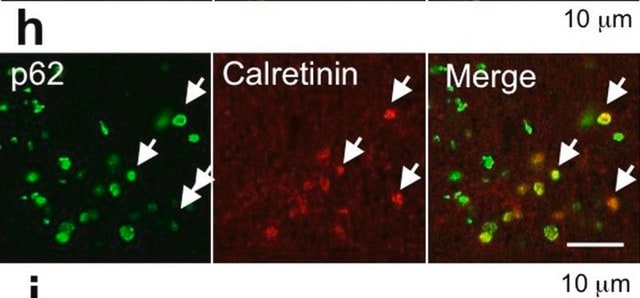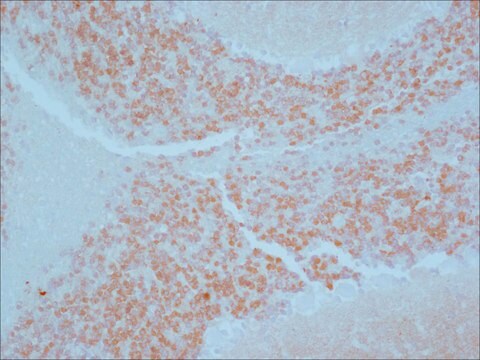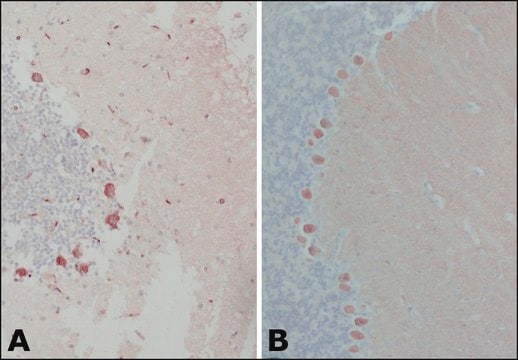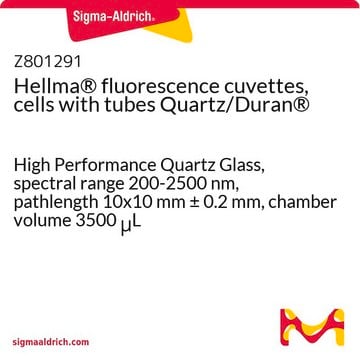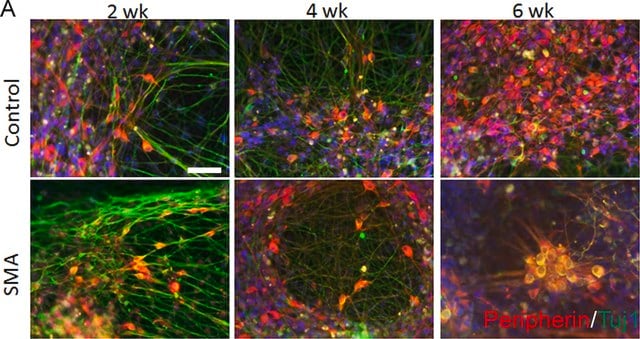AB5054
Anti-Calretinin Antibody
serum, Chemicon®
Zaloguj sięWyświetlanie cen organizacyjnych i kontraktowych
About This Item
Kod UNSPSC:
12352203
eCl@ss:
32160702
Polecane produkty
pochodzenie biologiczne
rabbit
Poziom jakości
forma przeciwciała
serum
klon
polyclonal
reaktywność gatunkowa
human, rat
producent / nazwa handlowa
Chemicon®
metody
immunohistochemistry (formalin-fixed, paraffin-embedded sections): suitable
western blot: suitable
numer dostępu NCBI
numer dostępu UniProt
Warunki transportu
dry ice
informacje o genach
human ... CALB2(794)
Opis ogólny
Calretinin is a 29 kDa calcium binding protein that is expressed in central and peripheral nervous system and in many normal and pathological tissues. Calretinin is also considered an important diagnostic aid in the differential diagnosis of cystic and solid ameloblastic tumors. The rat and human calretinin exhibit 98% sequence homology and 91% homology to many other species. Calretinin is generally expressed with two other calcium binding proteins Calbindin D-29 and parvalbumin in CNS and other peripheral tissues. Calretinin antibodies have been used to detect a number of carcinomas by clinicopathological, immunohistochemical techniques including, epithelial malignant mesotheliomas, Ovarian yolk sac tumor, Adenomatoid tumors of the uterus etc.
Specyficzność
Reactivity with other species has not been determined
Specific for calretinin. Recognizes both the calcium-bound and calcium-unbound conformations of calretinin by western blots.
Immunogen
Recombinant rat calretinin.
Zastosowanie
Research Category
Neuroscience
Neuroscience
Research Sub Category
Signaling Neuroscience
Signaling Neuroscience
This Anti-Calretinin Antibody is validated for use in IH, IH(P), WB for the detection of Calretinin.
Western blot:
1:1,000-1:2,000 of a previous lot was used.
Immunohistochemistry:
1:1,000-1:10,000
Antibody works in paraffin embedded tissues.
Optimal working dilutions must be determined by the end user.
1:1,000-1:2,000 of a previous lot was used.
Immunohistochemistry:
1:1,000-1:10,000
Antibody works in paraffin embedded tissues.
Optimal working dilutions must be determined by the end user.
Jakość
Immunohistochemistry(paraffin) Analysis:
Calretinin (cat. # AB5054) staining on Human Cerebellum. Tissue pretreated with Citrate, pH 6.0 plus. Antibody was diluted to 1:200 (5.0 µg/mL), using IHC-Select Detection with HRP-DAB. Immunoreactivity is seen as a nuclear and cytoplasmic punctate staining on neurons (brown).
Optimal Staining With Citrate Buffer Epitope Retrieval: Human Cerebellum.
Calretinin (cat. # AB5054) staining on Human Cerebellum. Tissue pretreated with Citrate, pH 6.0 plus. Antibody was diluted to 1:200 (5.0 µg/mL), using IHC-Select Detection with HRP-DAB. Immunoreactivity is seen as a nuclear and cytoplasmic punctate staining on neurons (brown).
Optimal Staining With Citrate Buffer Epitope Retrieval: Human Cerebellum.
Powiązanie
Replaces: AB149
Postać fizyczna
Rabbit polyclonal serum contains no preservative.
Unpurified
Przechowywanie i stabilność
Stable for 1 year at -20°C in undiluted aliquots from date of receipt.
Handling Recommendations:
Upon first thaw, and prior to removing the cap, centrifuge the vial and gently mix the solution. Aliquot into microcentrifuge tubes and store at -20°C. Avoid repeated freeze/thaw cycles, which may damage IgG and affect product performance.
Handling Recommendations:
Upon first thaw, and prior to removing the cap, centrifuge the vial and gently mix the solution. Aliquot into microcentrifuge tubes and store at -20°C. Avoid repeated freeze/thaw cycles, which may damage IgG and affect product performance.
Komentarz do analizy
Control
Rat brain cortex, Mesothelioma tissue, Human cerebellum.
Rat brain cortex, Mesothelioma tissue, Human cerebellum.
Inne uwagi
Concentration: Please refer to the Certificate of Analysis for the lot-specific concentration.
Informacje prawne
CHEMICON is a registered trademark of Merck KGaA, Darmstadt, Germany
Oświadczenie o zrzeczeniu się odpowiedzialności
Unless otherwise stated in our catalog or other company documentation accompanying the product(s), our products are intended for research use only and are not to be used for any other purpose, which includes but is not limited to, unauthorized commercial uses, in vitro diagnostic uses, ex vivo or in vivo therapeutic uses or any type of consumption or application to humans or animals.
Ta strona może zawierać tekst przetłumaczony maszynowo.
Kod klasy składowania
10 - Combustible liquids
Klasa zagrożenia wodnego (WGK)
WGK 1
Temperatura zapłonu (°F)
Not applicable
Temperatura zapłonu (°C)
Not applicable
Certyfikaty analizy (CoA)
Poszukaj Certyfikaty analizy (CoA), wpisując numer partii/serii produktów. Numery serii i partii można znaleźć na etykiecie produktu po słowach „seria” lub „partia”.
Masz już ten produkt?
Dokumenty związane z niedawno zakupionymi produktami zostały zamieszczone w Bibliotece dokumentów.
Repeated phencyclidine in monkeys results in loss of parvalbumin-containing axo-axonic projections in the prefrontal cortex.
Bret A Morrow, John D Elsworth, Robert H Roth
Psychopharmacology (Psychopharmacologia) null
Allison Walter et al.
FASEB journal : official publication of the Federation of American Societies for Experimental Biology, 24(9), 3360-3369 (2010-05-06)
This study evaluated the in vivo antitumor activity of grape-derived polyphenols. BALB/c mice were subcutaneously implanted with C26 colon carcinoma cells, and 2 d later they received either solvent or red wine polyphenols (RWPs) (100 mg/kg/d, human equivalent dose approximately
TRPV1 receptors modulate retinal development.
Mauro Leonelli,Daniel O Martins,Luiz R G Britto
International Journal of Developmental Neuroscience null
Nitric Oxide Synthase and Calcium-binding Protein-containing Neurons in the Hamster Visual Cortex
Lee, J.-E. et al.
Molecules and Cells, 18, 30-39 (2004)
Calcium-binding Protein Calretinin Immunoreactivity in the Dog Superior Colliculus.
Lee, Jea-Young, et al.
Acta Histochemica Et Cytochemica, 39, 125-138 (2006)
Nasz zespół naukowców ma doświadczenie we wszystkich obszarach badań, w tym w naukach przyrodniczych, materiałoznawstwie, syntezie chemicznej, chromatografii, analityce i wielu innych dziedzinach.
Skontaktuj się z zespołem ds. pomocy technicznej